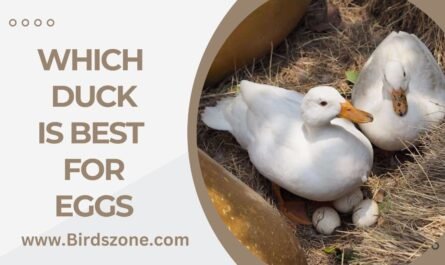Ducks are fascinating animals recognized for their distinctive behaviors and features. A very intriguing aspect of their life are their patterns for egg-laying. Knowing how frequently ducks lay eggs throughout the year is not just satisfying our curiosity, but it also offers important information to owners of ducks as well as breeders and fans. This article examines the patterns of eggs laid by ducks, and the causes that influence the frequency of their egg-laying, as well as what implications this has for the care of animals and breeding.
The Basics of Duck Reproduction
Understanding Duck Breeds
Different species of ducks have different reproduction styles. The most popular domestic breeds of duck include:
- Pekins: Known as a producer of meat, Pekins can lay about 200-300 eggs per year.
- Khaki Campbells: They are prolific layerers with a typical egg production of 250-350 every year.
- Indian Runners: Another extremely efficient breed, Indian Runners can lay about 200 to 300 eggs each year.
Every breed has their own distinct characteristics which affect the frequency at which they lay eggs.
The Duck’s Breeding Cycle
Ducks usually possess a reproductive pattern that coincides with seasons. The general period of reproduction begins around the beginning of spring, but can continue to in the latter part of the summer. During this time it is possible for ducks to lay eggs on a regular basis alike to their health as well as the environmental conditions.
Egg-Laying Frequency
Average Egg Production
A healthy female duck will lay between 200-300 eggs each year. The frequency of eggs laid can be wildly different depending on the breed as well as age, diet and the environmental circumstances.
Factors Influencing Egg Production
- Breed Specification: As mentioned earlier there are breeds that have more success than others.
- “Age of the Duck Ducks that are young (usually between 5 and 6 months) begin to lay eggs. Production is at its highest during the early years but could decrease when they get older.
- Diet and Nutrition A healthy, balanced diet high in vitamins, protein and minerals can significantly impact the ability of ducks to lay eggs. The ducks who are undernourished could produce fewer eggs, or cease egg laying completely.
- Light Conditions Ducks ‘ behavior is influenced by how much light they experience. Longer hours of daylight during the spring and summer months encourage egg production. On the other hand, shorter hours in winter and autumn could reduce the number of eggs laid.
- Health and Wellbeing Healthy ducks are an efficient duck. Regular check-ups with a veterinarian and the right habitat conditions can improve the production of eggs. In addition, stressors like predators excessive crowding and insufficient shelter may negatively impact egg production.
Seasonal Variations
The breeding season is when ducks are more likely to lay eggs. Outside the breeding season the production of eggs slows. A lot of ducks lay eggs but will stop in winter, as daylight hours are limited and temperatures fall. Some domesticated breeds are selectively breeding to lay eggs all year round.
Understanding the Laying Process

The Egg-Laying Cycle
The process of egg-laying starts when her body begins to prepare an egg within its reproductive system. It generally takes two to three hours from the time of the yolk’s formation until laying the egg.
- Yolk Formation The yolk is formed inside the ovary before being released in the oviduct.
- Egg White Form: As the yolk moves through the oviduct the egg’s white layers (albumen) are formed around it.
- Shell Form: The egg then is transferred to the egg’s shell gland and calcium carbonate is placed to form the eggshell.
- Laying the Egg Then, the finished egg has been laid.
Signs of Egg-Laying
Female ducks usually display particular behaviours when they’re ready to lay eggs. Signs that are typical include:
- Habits of nesting: Ducks could begin to build nests with feathers, grass as well as other items.
- Vocalizations: An boost in quacking may be a sign of the readiness to lay.
- Arousal: Ducks can seem more active, and may look for an appropriate site to lay eggs.
Caring for Laying Ducks
Providing the Right Environment
In order to maximize egg production the duck’s owners need to assure they favor their ducks with an environment that is safe and comfortable for their birds. Important considerations include:
- Nesting Boxes A good nesting box allows ducks and geese to lay eggs within specified areas, which reduces chances that eggs will be laid in inappropriate places.
- A Clean and Healthy Living Environment A dry, clean atmosphere reduces stress and diseases which can lead to a higher frequency of lay.
- Access to water: Ducks need access pure water to drink and for bathing. It is crucial to their health overall and egg production.
Nutrition for Egg-Laying Ducks
A high-quality and balanced diet that is specifically designed for laying hens can be crucial. The most important dietary elements are:
- high protein information: Layers require greater protein in order to help egg production. Find feed that contains minimum 16 percent protein.
- Calcium Supplements Calcium is crucial for eggshells that are strong. Shells of oysters that have been crushed or commercial calcium supplements may be added to the diet of your pet.
- Vitamins and Minerals Offering a variety of minerals and vitamins could loated tea recipe improve the health of your reproductive system.
Conclusion
In the end, ducks are able to lay anywhere between 200 and 350 eggs a year, dependent upon various aspects like breed, age, as well as the environment. Learning about the patterns of egg-laying ducks is vital to breeders and owners who want to keep healthy and productive bird species. Through providing an appropriate habitat, balanced food and regular attention the ducks can maximize egg production, and reap all the benefits offered by these delightful birds. It doesn’t matter if it’s for pleasure or for commercial reasons, understanding how to take care of egg-laying ducks can assure satisfaction and a successful enjoyment.



